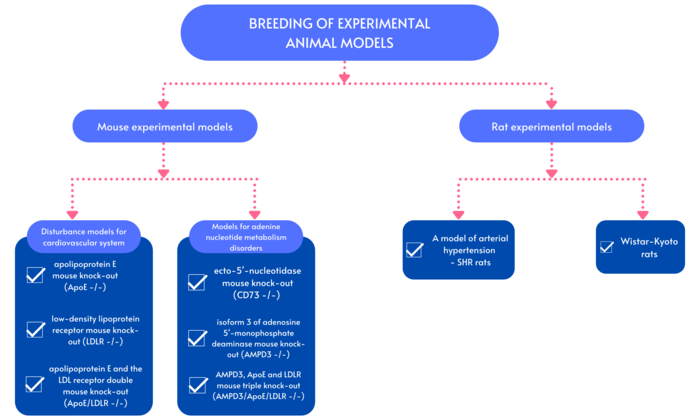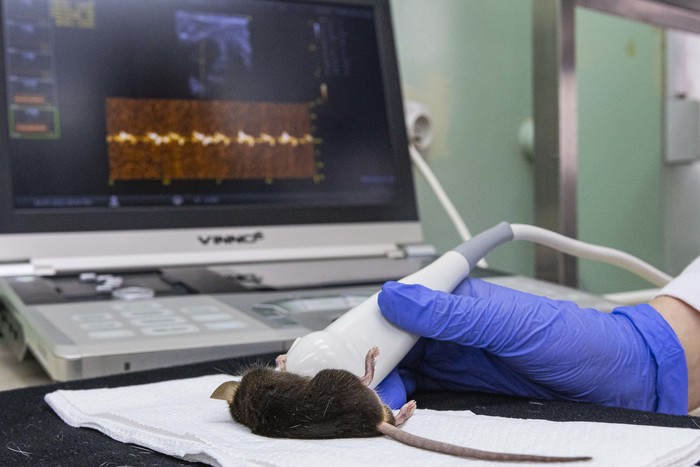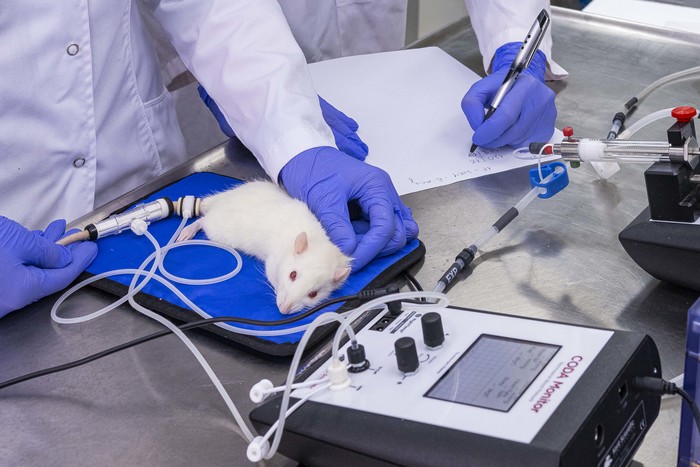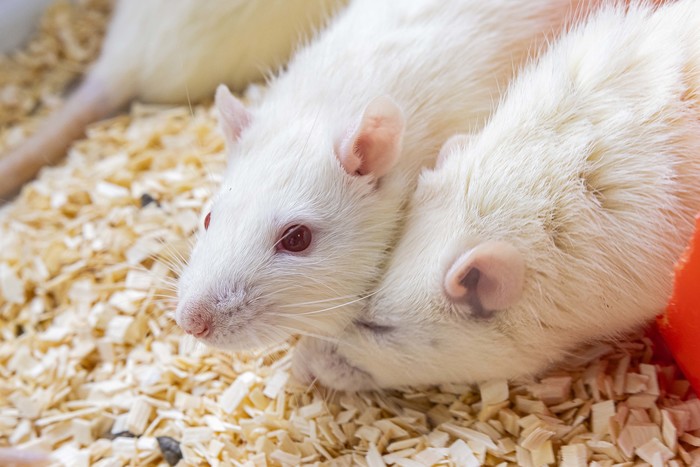Interdepartmental Laboratory for In Vivo Research
As part of the “Excellence Initiative – Research University” program, a new, interdepartmental core facility – the In Vivo Research Laboratory – begins operation at the Medical University of Gdańsk.
The unit was established thanks to the initiative of one of the coordinators of Research Team V: „In vivo studies on mechanism of disease and therapy” in PRA 3, and represents a synergistic collaboration of experienced scientists from the Departments that make up the laboratory, including:
- Division of Anatomy and Neurobiology,
- Division of Clinical Chemistry,
- Department of Pharmacology,
- Department of Biochemistry,
- Department of Biopharmacy and Pharmacodynamics (including the Division of Biopharmacy and Pharmacokinetics).
Our potential and range of services
Due to the interdisciplinary nature of the unit, collaboration with the In Vivo Research Laboratory allows for the planning and execution of specialized in vivo studies and analyses from different areas of experimental medicine during a single research project or preclinical trial.
The unit provides a wide range of services in the area of in vivo research, including:
1. Breeding of unique mouse and rat experimental models:

2. Performing experimental research in the field of:
- neurobiology and experimental neuroanatomy:
- behavioral testing of experimental animals,
- developing experimental animal models of hemorrhagic and ischemic cerebral strokes,
- developing animal models of obesity/type 2 diabetes,
- application of the stereology method in neurological research.
- experimental nephrolog:
- developing animal models of experimental nephrology: streptozotocin-induced diabetes mellitus, hyperangiotensinemia induced by a low sodium ion diet, hypercholesterolemia induced by a diet with increased cholesterol content, a model of chronic renal denervation,
- evaluation of urinary excretion of electrolytes, proteins and metabolites from the use of metabolic cages,
- doppler measurement of blood flow through the renal cortex and medulla,
- glomerular filtration rate assessment based on radioactive inulin clearance and transdermal fluorescence signal measurement using FITC-sinistrin,
- microdialysis of interstitial fluid of the renal cortex,
- renal artery myography,
- measuring the intracapillary volume of isolated glomeruli,
- “ex vivo” evaluation of intestinal peristalsis in rats in different clinical situations.
- experimental cardiology:
- measurement of smooth muscle and cardiac muscle (papillary muscle) contraction parameters,
- assessment of pulmonary vascular and parenchymal changes in pulmonary hypertension,
- evaluation of platelet aggregation on human specimens and from a rabbit diabetes model induced by streptazotocin,
- telemetric measurement of blood pressure and heart rate and internal temperature in various experimental models like pulmonary hypertension, diabetes,
- ECG measurement in laboratory animals (under normoxia or hypoxia),
- ECHO measurement of the heart in laboratory animals,
- measurement of muscle strength of laboratory animals,
- studies of function and metabolism of isolated organs (in the Langedorff perfusion system),
- studying the function and metabolism of isolated mitochondria,
- studying the substrate preference of cardiac and skeletal muscle experimental animal models,
- studies using an isolated atrial heart model of a rat.
- experimental oncology:
- induction chemotherapy (MPA, DMBA) of breast cancer in mice,
- orthotopic mouse model of breast cancer (injection of breast cancer cells into the mammary fat pad),
- syngeneic mouse model of melanoma (subcutaneous injection of melanoma cells),
- extraction of primary cell cultures (mechanical/enzymatic isolation methods of tumor or lung endothelial cells and generating primary cell cultures).
- experimental pharmacology:
- evaluating the effectiveness of analgesics,
- determination of pharmacokinetic profiles.
3. Performing quantitative compound assays and biochemical analyses in animal biological samples:
- analysis of plasma lipoprotein composition,
- assessment of plasma and serum biochemical parameters,
- determination of nitrogenous compounds concentrations (nucleotides, amino acids, nicotinamide metabolites and their derivatives).
4. Support in basic in vivo testing procedures and other research methods including:
- chronic administration of biologically active compounds using osmotic pumps,
- subcutaneous, intraperitoneal, intravenous administration of pharmaceuticals,
- survivor blood draws,
- intubation and artificial ventilation (crucial for metabolic tests),
- necropsy (euthanasia of animals, isolation of organs and tissues, stereoscopic analysis of metastases),
- preparation of animal tissues for research, histology/immunohistochemistry tests and specimen analysis in histology and immunohistochemistry,
- testing isolated animal tissue section specimens.
The Laboratory also offers consultations for research and development projects to employees and doctoral students of the Medical University of Gdańsk, as well as to external institutions. It also provides thematic practical workshops for researchers and clinicians using animal models (e.g. in the field of neurosurgery or microsurgery).
Price list:
Collaboration with the laboratory may be commercial or non-commercial in nature (joint scientific research projects, scientific publications).
Laboratories will perform analyses according to individual orders with customization to meet specific contractor needs. The cost of the service is priced individually.
CONTACT

Marta Tomczyk, Ph.D.
Head of the Interdepartmental Laboratory for In Vivo Research
Medical University of Gdańsk
Phone: 58 349 14 60
marta.tomczyk@gumed.edu.pl
photo: Paweł Sudara/MUG


